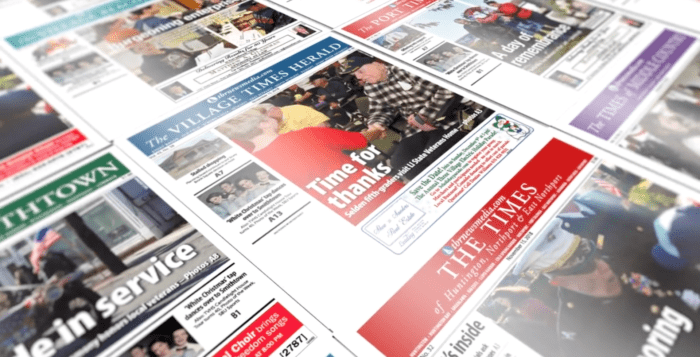Between You and Me: A big thank you to the federal government
By Leah S. Dunaief

Since we were thinking of all we are grateful for this Thanksgiving, I can now add one more item to the list. It seems that government officials have finally noticed how important newspapers and media, especially local news media, are, and they want to help us survive. In fact, attitudes on the part of media members toward government have also changed in the last couple of years, thanks strangely to the coronavirus pandemic.
The grim numbers tell the story. According to an article in this past Monday’s issue of The New York Times, there are now 200 counties in the United States without a newspaper. These are being referred to as newspaper deserts. More than 2100 have shut down since 2004. This is in part due to the rise in digital media that has broken the business model of advertising support for local newspapers, with the final blow delivered by COVID-19. According to the Pew Research Center, the number of journalists at newspapers fell to 31,000 last year from 71,000 in 2008.
At the same time, in order to stay afloat, many newspapers have accepted help from the federal government’s Paycheck Protection Program with forgivable loans, assuaging fears of publishers of an inherent conflict of interest in accepting federal help. After all, newspapers are considered the watchdogs of the powerful, including government, on behalf of the people. We have been leery of any quid pro quo by accepting government help until now. But there have been no restrictions or demands put on news gatherers in this program, proving that such support can work if properly administered, and those loans have doubtlessly saved the number of shuttered newspapers from being greater.
“I don’t think we’d be having this conversation [about government support for local media] if it were not for the impact of Covid and the role that it played in accelerating challenges the [news] sector has faced,” said Damian Radcliff, a professor at the University of Oregon School of Journalism and Communications in The Times.
A tax credit for local newspapers was one of the main items in the Local Journalism Sustainability Act, a bipartisan bill that appeared before Congress in 2020 and was reintroduced this year. Among its supporters was local U.S. Rep. Lee Zeldin (R-NY1). When it stalled, it was then put into the latest $2.2 trillion package, as a payroll tax credit, the giant bill having passed the House and now awaits its fate at the hands of the Senate.
Why should the government help newspapers?
For starters, there is early precedent in United States history. The Postal Act of 1792 gave newspapers significantly cheaper mail rates. The maxim about an informed public being the cornerstone of democracy still holds. A free press is enshrined in the First Amendment, and the way to help pay for it was, and still is, by reduced postage. To this day, newspapers that are so designated because they carry a significant percentage of news, as opposed to only advertising, move at the rate of first class mail.
As for local news that most directly affects everyday life, who but the local news outlets would routinely cover local school board, town board and civics meetings? It is in the local news where births, deaths. graduations and weddings are noted. Local student sports teams, student musicians and academic accomplishments are proudly published, as are local cultural events, exhibitions and fairs. In addition to holding local officials accountable, local newspapers define the boundaries of a community and strengthen its bonds.
Other ways that government can help news outlets include placing advertising from their various agencies. Such a program helped newspapers in New York City this past year for a total of some $10 million, at the behest of Mayor de Blasio. Although counties already advertise legal notices in newspapers, those are not usually equitably placed but rather are saved for the partisan papers by the party in control. A legislator in New Jersey suggested giving residents a $250 deduction on their taxes if they subscribed to a local news outlet.
I can tell you that were we to receive any sort of financial help from the government, it would go directly toward publishing more local news for you.







